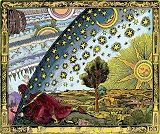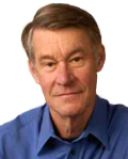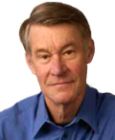The eternal silence of these infinite spaces frightens me.

The eternal silence of these infinite spaces frightens me.
– Blaise Pascal (1623–1662), French mathematician, physicist and philosopher
Anyone living in a house, if he is ignorant of its materials or construction, its size and kind, its position and distinguishing characteristics, is not worthy of being a guest in such a place. Similarly, he who is born and brought up in the hall of the universe, if he neglects to get to know the reason for its wonderful beauty when he reaches maturity, is unworthy of that hall and, if it should be possible, must be thrust out of it.
– Adelard of Bath, 12th century English philosopher who introduced Arabic science to Europe
In the middle of all sits the Sun enthroned. In this most beautiful temple, could we place this luminary in any better position from which he can illuminate the whole at once? He is rightly called the Lamp, the Mind, the Ruler of the Universe. So the Sun sits as upon a royal throne, ruling his children, the planets which circle round him.
– Nicholas Copernicus (1473–1543), Polish astronomer whose model of the planets orbiting the sun challenged the prevailing earth-centered model. In its time this view was revolutionary and blasphemous. Copernicus's new cosmology—that the planets revolve—transformed both our sense of our place in the Universe and our sense of ourselves, and gave us the term ”revolution” to describe such upheavals, whether scientific or political.
To consider the earth as the only populated world in infinite space is as absurd as to assert that in an entire field of millet, only one grain will grow.
– Metrodorus, Greek philosopher of the 4th century BCE
Our sun is one of 100 billion stars in our galaxy. Our galaxy is one of billions of galaxies populating the universe. It would be the height of presumption to think that we are the only living things in that enormous immensity.
– Wernher von Braun (1912–1977), German, and later, American rocket pioneer
The Earth is just too small and fragile a basket for the human race to keep all its eggs in.
– Robert Heinlein (1907–1988), American science fiction writer
Sooner or later every one of us breathes an atom that has been breathed before by anyone you can think of who has lived before us—Michelangelo or George Washington or Moses.
– Jacob Bronowski (1908–1974), Creator of the television series The Ascent of Man
From a human point of view, the difference between the mind of a human being and that of a mountain goat is wonderful; from the point of view of the infinite ignorance that surrounds us, the difference is not impressive.
– Wendell Berry (1934– ), American writer, environmental activist, and farmer
We had succeeded in showing that everything is made of stardust. We were stardust.
– Hans Bethe (1906–2005), German-born American Nobel-laureate physicist who explained how nuclear reactions generate energy in stars
The World would be a safer place, / If someone had a plan, / Before exploring Outer Space, / To find the Inner Man.
– Edgar Y. Harburg (1898–1981), American who wrote the words to the song "Over the Rainbow" for the film The Wizard of Oz
Viewed from the distance of the moon, the astonishing thing about the earth is that it is alive. Aloft, floating free beneath the moist, gleaming, membrane of bright blue sky, is the rising earth, the only exuberant thing in this part of the cosmos.
The uniformity of earth's life, more astonishing than its diversity, is accountable by the high probability that we derived, originally, from some single cell, fertilized in a bolt of lightning as the earth cooled.
It is from the progeny of this parent cell that we all take our looks; we still share genes around, and the resemblance of the enzymes of grasses to those of whales is in fact a family resemblance.
– Lewis Thomas (1913–1993), American biologist and writer
If you wish to make an apple pie from scratch, you must first invent the Universe.
– Carl Sagan (1934–1996), American astronomer, writer and creator of the television series Cosmos
All we know is still infinitely less than all that still remains unknown.
– William Harvey (1578–1657), English physician and discoverer of the circulation of the blood
The known is finite, the unknown infinite; intellectually we stand on an islet in the midst of an illimitable ocean of inexplicability. Our business in every generation is to reclaim a little more land, to add something to the extent and solidity of our possessions.
– Thomas Henry Huxley (1825–1895), English naturalist
The more the universe seems incomprehensible, the more it also seems pointless. The effort to understand the universe is one of the very few things that lifts human life a little above the level of farce and gives it some of the grace of tragedy.
– Steven Weinberg (1933– ), American Nobel-laureate physicist
[The] tyranny of the genes has lasted for three billion years and has been precariously overthrown only in the last hundred thousand years by a single species, Homo sapiens. We have overthrown the tyranny by inventing symbolic language and culture. Our behavior patterns are now to a great extent culturally rather than genetically determined. We can choose to keep a defective gene in circulation because our culture tells us not to let hemophiliac children die. We have stolen back from our genes the freedom to make choices and to make mistakes.
– Freeman Dyson (1923– ), British-born American physicist and writer
The universe is infinite in all directions, not only above us in the large but also below us in the small. If we start from our human scale of existence and explore the content of the universe further and further, we finally arrive, both in the large and in the small, at misty distances where first our senses and then even our concepts fail us.
– Emil Wiechert (1861–1928), German physicist, writing in 1896, as quoted by Freeman Dyson in his book Infinite In All Directions.
I just couldn't look at the sky without wondering how anyone could do anything but study the stars. Probably the greatest bliss I have ever known has been working at the telescope.
– Vera C. Rubin (1928– ), American astronomer
There is a straight ladder from the atom to the grain of sand and the real mystery is the missing rung. Above it, classical physics. Below it, quantum physics. But in between, metaphysics.
– Tom Stoppard (1937– ), English dramatist, from his play Hapgood, which is replete with ideas from quantum physics
What is man in nature? Nothing in relation to the infinite, all in relation to nothing, a mean between nothing and everything.
What a chimera then is man! What a novelty! What a monster, what a chaos, what a contradiction, what a prodigy! Judge of all things, feeble earthworm, depository of truth, a sink of uncertainty and error, the glory and the shame of the universe.
Man is but a reed, the weakest in nature; but he is a thinking reed.
– Blaise Pascal (1623–1662), French mathematician, physicist and philosopher.
The history of civilization details the steps by which men have succeeded in building up an artificial world within the cosmos. Fragile reed as he may be, man, as Pascal says, is a thinking reed: there lies within him a fund of energy, operating intelligently and so far akin to that which pervades the universe, that it is competent to influence and modify the cosmic process. In virtue of his intelligence, the dwarf bends the Titan to his will.
– Thomas Henry Huxley (1825–1895), English naturalist
The most incomprehensible thing about the world is that it is comprehensible.
– Albert Einstein (1879–1955)
Nothing troubles me more than time and space; and yet nothing troubles me less, as I never think about them.
– Charles Lamb (1775–1834), English essayist, known, with his sister Mary, for their Tales from Shakespeare.
A man said to the universe: / "Sir, I exist!" / "However," replied the universe, / "That fact has not created in me / A sense of obligation."
– Stephen Crane (1871–1900), American author of Civil War classic, The Red Badge of Courage.
I accept the Universe.
– Margaret Fuller (1810–1850), American feminist and critic
By God! she'd better.
– Thomas Carlyle's reputed rejoinder
We know more about the surface of the moon than we do about the bottom of the sea. Having access to that mysterious place will be one of the most exciting things ever to happen. We ought to go [down] 10,000 feet, live there, play there, and travel around. I think it's the only avenue to understanding. I'd like to lure everyone down there to see for themselves. I care about the fate of the plants and animals that share the planet with us. And I care about our own fate. I don't think we'd continue to dump waste in the ocean if we could see what happens to it.
–Sylvia Earle (1935– ), American marine biologist




